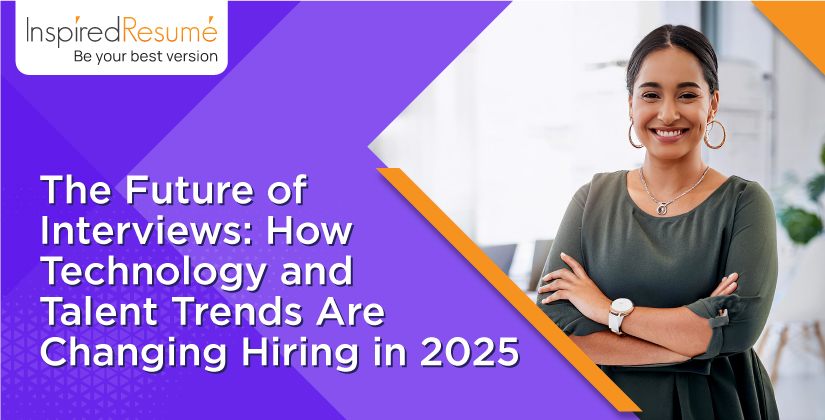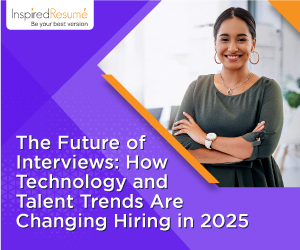Approximately 88% of companies already use some form of AI for initial candidate screening. (Source: World Economic Forum)
Imagine this: you are wearing a VR headset, navigating a simulated office while solving a live problem, as an algorithm silently gauges your responses, tone, and even micro-expressions. No recruiter in sight; just data.
The job interview, as we know it, is undergoing a radical transformation.
The question is—are you prepared?
From asynchronous video interviews to gamified hiring challenges, companies are redefining how they evaluate talent. Traditional cues; firm handshakes, polished small talk, printed resumes; are being replaced by digital fluency, real-time simulations, and AI-analyzed soft skills. And candidates who don’t adapt? They're already falling behind.
This guide explores some groundbreaking trends; from VR simulations and AI-driven interviews to ethical concerns around algorithmic bias; and offers actionable strategies to help you master the future of hiring.
Looking for a professional Resume Assessment service? Get it here!
The Evolution of Job Interviews: From Boardrooms to Bytes
Interviews have transformed significantly over time, influenced by cultural shifts, technological innovations, and changing workplace dynamics. Understanding this evolution provides insights into current practices and future expectations.
How Interviews Began: A Historical Perspective on Candidate Evaluation
Interviews have existed in various forms for centuries. Early methods included informal discussions, often based on personal recommendations. The industrial revolution introduced more structured formats, aiming for standardization.
By the mid-20th century, behavioral interviews emerged, focusing on past experiences as indicators of future performance. Employers began to emphasize skills and cultural fit. The emergence of human resource management during this period further refined interview techniques, leading to the use of standardized questions and assessment criteria.
Digital Disruption: How Technology Is Reshaping the Interview Process
Technology has significantly changed the interview landscape. In the 2010s, video conferencing began to replace some in-person interviews, allowing companies to connect with candidates across distances. This marked the beginning of remote evaluation.
With the rise of digital tools, employers now utilize applicant tracking systems (ATS) that streamline the hiring process. Artificial intelligence (AI) plays a growing role in screening candidates, analyzing resumes, and even conducting initial assessments.
Virtual reality (VR) is also being explored for immersive interview experiences, offering insights into candidate reactions and decision-making processes.
Remote Interviews and the Rise of Virtual Hiring Practices
The shift toward remote work has significantly transformed how interviews are conducted. Today, most organizations rely on virtual platforms like Zoom, Microsoft Teams, or dedicated hiring tools to screen and evaluate candidates—cutting down on time, travel, and costs traditionally associated with in-person interviews.
But beyond convenience, the process itself has matured. Remote interviews now mirror the rigor of in-office assessments, with companies incorporating elements such as live coding tests, problem-solving exercises, and AI-enabled proctoring to ensure fairness and integrity. In many cases, candidates are asked to perform real-time tasks or participate in simulated work environments to demonstrate job-specific competencies.
Interview formats have also evolved to include asynchronous video interviews, where candidates record answers to standardized questions. This allows hiring teams to review responses at their convenience while providing candidates more flexibility in participation.
While this virtual format initially required candidates to adapt, it has now become second nature for most professionals. Skills like digital communication, virtual collaboration, and self-motivation remain essential, but what truly stands out today is a candidate's ability to bring their best to a virtual environment with the same professionalism and preparedness expected in a traditional office setting.
|
Checklist: Understanding Interview Evolution |
|
|
|
Master Behavioral Interviews with the STAR Method
Emerging Interview Formats That Are Redefining Hiring
The landscape of job interviews is evolving with technology creating new ways to assess candidates. Innovations such as virtual reality assessments, asynchronous video interviews, and gamified challenges are transforming traditional interview processes.
Virtual Reality Interviews: The New Face of Real-World Simulations
Virtual reality (VR) assessments immerse candidates in job-relevant simulations, allowing employers to observe problem-solving and teamwork skills in action. Candidates navigate virtual environments, tackle challenges, and interact with digital objects. VR offers a standardized, bias-free assessment format that boosts engagement and improves skill evaluation accuracy.
Several companies have incorporated virtual reality (VR) into their recruitment processes to enhance candidate evaluation and engagement. Here are some notable examples:
In 2017, Lloyds Banking Group introduced VR assessments for its Digital and IT Graduate Schemes. Candidates were immersed in 360-degree virtual scenarios where they demonstrated problem-solving abilities by interacting with digital objects. This approach allowed assessors to observe candidates' skills in action, providing a more dynamic evaluation than traditional interviews.
In collaboration with the virtual band Gorillaz, Jaguar Land Rover launched a mixed-reality app featuring code-breaking puzzles within a virtual garage. This initiative targeted software engineers and mathematicians, with top performers fast-tracked through the recruitment process.
Gamified Assessments: Turning Interview Questions into Interactive Challenges
Gamified challenges use game mechanics—like scoring, leaderboards, and interactive tasks—to assess candidates in a fun, engaging way. They often mirror real job tasks, helping measure skills like critical thinking, creativity, and collaboration. This approach improves candidate experience, reduces interview fatigue, and attracts innovative talent.
Several companies have successfully implemented gamified assessments in their hiring processes. Here are some notable examples:
Unilever revamped its early-career recruitment by integrating gamified assessments. Applicants engage in a series of online games designed to evaluate skills such as concentration, memory, and problem-solving. This approach led to a 75% reduction in time-to-hire and enhanced candidate engagement.
Knack developed "Balloon Brigade," a mobile game that assesses candidates' strategic thinking and creativity. Companies like Shell and NYU have utilized Knack's games to identify potential talent.
|
Checklist: Mastering New Interview Formats |
|
|
|
Practical Tips For Career Advancement
How AI Is Transforming The Job Interview Process in 2025
Artificial intelligence is shaping the interview landscape by streamlining processes and enhancing decision-making. Key areas impacted include the automation of scheduling interviews and the screening of candidates, along with creating tailored algorithms for interviews.
Smart Scheduling: AI Tools That Automate the Interview Setup
Automated interview schedulers use AI algorithms to efficiently manage appointment bookings. By analyzing both interviewer and candidate availability, these tools eliminate the back-and-forth of scheduling.
Companies benefit from reduced administrative burden, allowing teams to focus on core hiring activities. Candidates also experience improved convenience as they receive real-time updates and customizable scheduling options, which enhance their experience.
Some popular automated scheduling tools include:
- Calendly
- HireVue
- GoodTime
These platforms integrate with calendars, making it easy to sync schedules with just a few clicks.
Resume to Shortlist: AI-Powered Candidate Screening Explained
AI-powered candidate screening tools like HireVue, Pymetrics, Hiretual (now hireEZ), and Pymetrics filter applications based on predefined criteria. These tools analyze resumes, cover letters, and even behavioral traits to identify the best-fit candidates for specific roles. For example, HireVue uses AI to assess video interviews and resume data, while hireEZ uses machine learning to source and rank candidates from various platforms. This significantly reduces the time recruiters spend sifting through applications, enabling faster and more objective hiring decisions.
Key advantages include:
- Bias Reduction: Algorithms can help diminish human biases in the initial screening.
- Efficiency: With AI, organizations can process large volumes of applications rapidly.
The use of natural language processing (NLP) allows these tools to understand context and nuances in resumes, improving match accuracy.
Algorithmic Interviews: Custom AI Questions and Real-Time Feedback
Customized interview algorithms assess candidates based on tailored criteria. Organizations can create specific question sets aligned with job requirements and skills, improving relevance and efficiency in hiring. Tools like HackerRank, Codility, and HireVue offer capabilities to design role-specific interview questions and use AI to evaluate responses in real time. Platforms like InterviewVector and Pymetrics also incorporate behavioral science and AI to assess candidates against defined competency frameworks.
These systems adapt to the candidates’ responses, allowing for dynamic questioning that digs deeper into candidate qualifications.
Some key features include:
- Real-Time Feedback: Interviewers receive insights during the evaluation process.
- Scalability: These algorithms can easily handle increasing applicant numbers without compromising quality.
The integration of AI in interviews creates a more structured approach to candidate evaluation, ensuring a consistent experience for all applicants.
|
Checklist: Navigating AI in Hiring |
|
|
|
How To Navigate A Successful Career Change
Preparing for the Future: How Candidates Can Win at Next-Gen Interviews
Candidates must equip themselves with new skills and approaches to succeed in the evolving landscape of job interviews. Emphasizing research, digital proficiency, soft skills, and personal branding will significantly enhance their marketability.
Research and Readiness: Mastering Different Interview Formats
Understanding a company's culture and values is crucial. Candidates should research the organization's mission, recent developments, and industry trends. This information allows applicants to tailor their responses to reflect alignment with the company's goals.
Adaptability is equally important. Job seekers should practice responding to different interview formats, including virtual, in-person, or panel interviews. Flexibility in communication styles can impress interviewers and demonstrate readiness for diverse work environments.
Sharpen Your Digital Skills: From Zoom to Assessment Portals
Digital literacy has become essential for job seekers. Familiarity with various digital tools, such as video conferencing software and collaboration platforms, is necessary for effective communication.
Candidates should also explore how to navigate online assessment tools that some employers use. Preparing for technical tasks or interviews on these platforms can set applicants apart.
Staying updated on industry-related technologies can further enhance their qualifications, enabling them to demonstrate knowledge that is relevant to the role.
Showcasing Soft Skills: What Interview AI Still Can’t Replace
Soft skills have gained prominence in hiring decisions. These include communication, teamwork, and problem-solving abilities. Candidates must focus on showcasing these skills during interviews.
Practical examples of applying soft skills can impress interviewers. For instance, discussing past collaborative projects can highlight an applicant’s teamwork capabilities.
Problem-solving scenarios can reveal how a candidate addresses challenges effectively. By illustrating these competencies, candidates can make a lasting impression.
Online Personal Branding: Why Your LinkedIn May Be Your First Interview
An online presence significantly affects job prospects. Candidates should optimize their LinkedIn profiles to reflect their skills, experiences, and achievements clearly. A professional photo and an impactful headline can create a strong first impression.
Engaging in industry-related discussions on social media and sharing relevant content can enhance visibility. This strategy positions candidates as knowledgeable and passionate about their field.
Consistency across online platforms is essential. Ensuring that all profiles convey a unified and professional image strengthens personal branding efforts.
|
Checklist: Future Interview Prep |
|
|
|
Ethics, Bias, and Fairness in AI-Driven Interviews: What Every Employer Must Know
As AI becomes integral to recruitment, organizations must navigate the legal and ethical responsibilities that come with it.
Why This Matters for Employers
The adoption of AI in recruitment brings efficiency—but also new layers of responsibility. Organizations must proactively address legal and ethical challenges to ensure fairness, transparency, and compliance in their hiring practices. Failure to do so can expose companies to reputational damage, legal action, and talent loss.
Candidate Data & Privacy: What Employers Must Get Right
Data privacy is not optional—it’s a legal mandate. With regulations like GDPR and CCPA setting strict boundaries, employers must ensure that candidate data is collected, stored, and processed responsibly.
Action Points:
- Establish clear consent and data usage protocols during hiring.
- Use enterprise-grade encryption and limit data access to only necessary roles.
- Schedule regular data audits to stay compliant and secure.
Algorithmic Bias in Interviews: Is Your AI Model Audit-Ready?
AI models are only as fair as the data they’re trained on. If unchecked, AI can replicate and amplify existing biases—leading to discriminatory outcomes and potential legal scrutiny.
Action Points:
- Partner with vendors offering bias-tested AI tools.
- Commission independent audits for fairness and diversity impact.
- Mandate human oversight for all AI-based shortlisting or rejections.Transparency in the Hiring Process: A Competitive Advantage
Transparent communication enhances candidate experience and builds brand trust. Letting candidates know how decisions are made—and what happens with their data—can help reduce disputes and improve employer branding.
Action Points:
- Clearly articulate the selection process and evaluation criteria.
- Implement structured feedback loops post-interview.
- Ensure candidate-facing materials explain AI involvement in assessments.
|
Checklist for HR & Compliance Teams |
|
Ensure your hiring process meets ethical and legal standards: |
|
|
|
|
🎯 Take the Interview Readiness Quiz
Want to know how future-ready you are? Our Interview Readiness Quiz helps evaluate your preparedness for formats like VR assessments, AI screenings, and asynchronous interviews.
Take the Interview Readiness Quiz
Use your results to pinpoint what to sharpen—and where you already shine.
It’s quick, insightful, and your first step toward interview confidence!
Conclusion: How to Stay Confident—and Competitive—In the Future of Interviews
In a world where technology and talent strategies continue to evolve, the future of interviews is set to be more dynamic, data-driven, and digitally enabled. For candidates, success will hinge on adaptability—embracing new formats, refining digital fluency, and cultivating a strong online presence. Employers, in turn, must balance innovation with fairness, ensuring transparency and ethical practices in the hiring process. As both sides navigate this transformation, preparation will remain the cornerstone of a successful interview. By staying informed and proactive, candidates can confidently face the future of interviews—and stand out in it.




